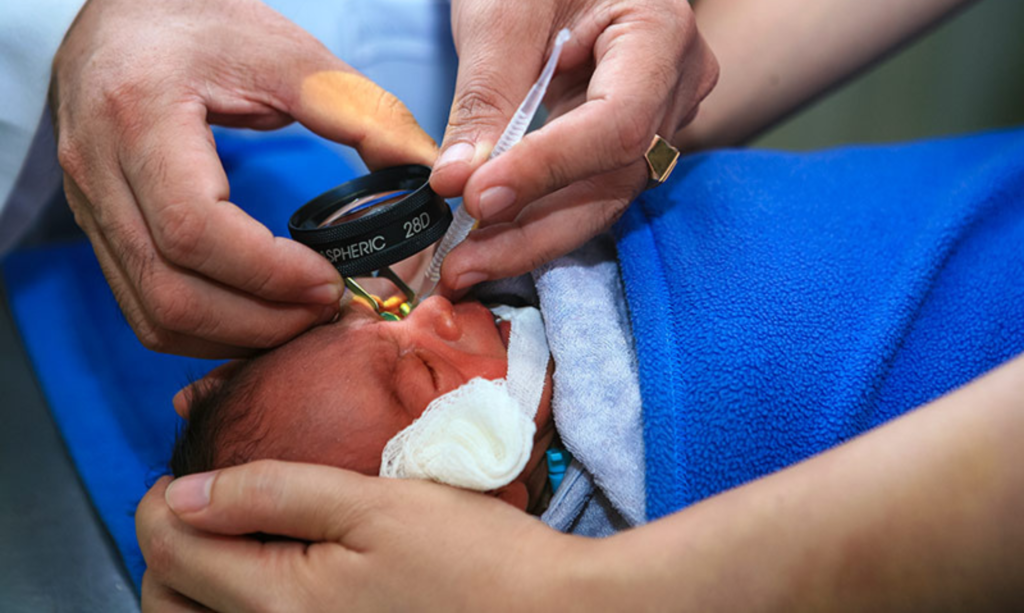
Retinopathy of Prematurity (ROP) Screening in Dhule
Shri Ramchandra Netralaya in Dhule provides Retinopathy of Prematurity (ROP) Screening, specializing in early detection of retinal issues in premature infants.
- Comprehensive Eye Care Services
- Experienced Eye Care Specialists
- Utilizing Cutting-Edge Technology
What is retinopathy of prematurity (ROP) screening?
Retinopathy of Prematurity (ROP) is a potentially blinding eye disorder that primarily affects premature infants. It occurs when abnormal blood vessels grow and spread throughout the retina, the light-sensitive tissue inside the eye. These vessels can cause retinal detachment, leading to blindness. Factors contributing to ROP include prematurity, low birth weight, and the use of oxygen therapy in neonatal care.
Signs of Retinopathy of Prematurity (ROP) Screening
-
Unusual or irregular eye movements in the infant
-
Leukocoria indicates severe ROP
-
Pupils don't dilate properly
-
Strabismus may signal vision issues
-
Premature nearsightedness suggests ROP
-
Indicative of stress or irritation in the eye
-
Eye swelling indicates advanced ROP
-
No response suggests ROP


Book Your Appointment at Shri Ramchandra Netralaya for specialized Eye Care
What causes of retinopathy of prematurity (ROP) screening?
-
Prematurity: Retinopathy of prematurity affects pre-31-week infants with undeveloped retinal vessels.
-
Oxygen Therapy: High oxygen disrupts retinal growth in preemies.
-
Low Birth Weight: Infants under 1500g face increased ROP risk due to incomplete development.
-
Poor Postnatal Growth:Poor weight gain and growth post-birth can worsen ROP severity.
-
Blood Transfusions: Some studies link multiple blood transfusions to higher ROP risk.

How is retinopathy of prematurity (ROP) screening performed?
Retinopathy of prematurity (ROP) screening is a crucial process performed on preterm infants to detect retinal abnormalities that can lead to blindness. An ophthalmologist examines the retina using an indirect ophthalmoscope or a retinal camera, often after pupil dilation. The exam’s frequency depends on gestational age and initial findings. Timely screening enables early intervention, such as laser therapy or anti-VEGF injections, to prevent or manage ROP progression.
Instructions for eye patients after surgery:
- Do not rub the operated eye.
- While bathing, pour water below the neck for four weeks, not on the head.
- Do not allow water to enter the eyes; wipe the face clean with a wet cloth.
- Do not sleep on the side of the operated eye for at least two weeks.
- Wear dark glasses for a month to avoid strong light and dust.
- With a clean soft cloth or handkerchief, gently dab the water coming from the eye only after it reaches the cheek, do not put pressure on the eye.
- If the eye becomes very painful or red, see a doctor immediately.
- Do not lift heavy objects or cough strenuously.
- Keep small children away to avoid accidental contact or injury while they play.
- Twice a day, soak cotton in hot water, squeeze it, and then clean the eyes from outside.
- Take your usual tablets for high blood pressure, diabetes, asthma, heart disease, and other conditions as prescribed.
- Take a light diet for 2 days after operation and avoid solid foods that are hard to chew.
- Patients can walk in the open environment but should avoid crowded places.
- Hands should be washed and wiped before instilling eye drops. Drops should be applied by gently pulling the lower eyelid.
- Apply the eye drops as directed and keep the eye closed for five minutes.
- Do not use a pin/ needle to open a new drop. It should be opened as directed, leaving a gap of 15 to 20 minutes between two drops.
- Avoid watching TV, reading, computer, and cooking for at least 8 days.
- Follow up as advised by the consultant.
- The glasses will be prescribed after a month.
- If the blood thinning pill is stopped before the operation, start it from the second day after the operation.
Before & After Result




Book Your Appointment Now!
Opening Hours
- Monday - 9:00 am - 9:00 pm
- Tuesday - 9:00 am - 9:00 pm
- Wednesday - 9:00 am - 9:00 pm
- Thursday - 9:00 am - 9:00 pm
- Friday - 9:00 am - 9:00 pm
- Saturday - 9:00 am - 9:00 pm
- Sunday - 9:00 am - 12:00 pm
